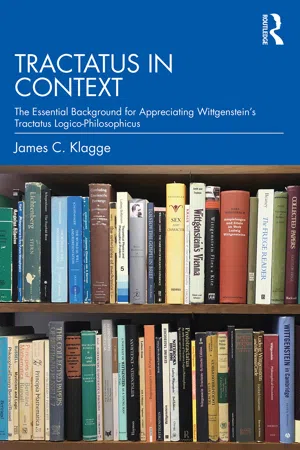
Tractatus in Context
The Essential Background for Appreciating Wittgenstein’s Tractatus Logico-Philosophicus
- 408 pages
- English
- ePUB (mobile friendly)
- Available on iOS & Android
Tractatus in Context
The Essential Background for Appreciating Wittgenstein’s Tractatus Logico-Philosophicus
About This Book
Ludwig Wittgenstein's brief Tractatus Logico-Philosophicus (1922) is one of the most important philosophical works of the twentieth century, yet it offers little orientation for the reader. The first-time reader is left wondering what it could be about, and the scholar is left with little guidance for interpretation.
In Tractatus in Context, James C. Klagge presents the vital background necessary for appreciating Wittgenstein's gnomic masterpiece. Tractatus in Context contains the early reactions to the Tractatus, including the initial reviews written in 1922-1924. And while we can't talk with Wittgenstein, we can do the next best thing—hear what he had to say about the Tractatus. Klagge thus presents what Wittgenstein thought about germane issues leading up to his writing the book, in discussions and correspondence with others about his ideas, and what he had to say about the Tractatus after it was written—in letters, lectures and conversations. It offers, you might say, Wittgenstein's own commentary on the book.
Key Features:
-
- Illuminates what is at stake in the Tractatus, by providing the views of others that engaged Wittgenstein as he was writing it.
- Includes Wittgenstein's earlier thoughts on ideas in the book as recorded in his notebooks, letters, and conversations as well as his later, retrospective comments on those ideas.
- Draws on new or little-known sources, such as Wittgenstein's coded notebooks, Hermine's notes, Frege's letters, Hänsel's diary, Ramsey's notes, and Skinner's dictations.
- Draws connections between the background context and specific passages in the Tractatus, using a proposition-by-proposition commentary.
Frequently asked questions
Information
1
Prefatory Material
Title: Tractatus Logico-Philosophicus
Author: Ludwig Wittgenstein
Dedication: Dedicated to the memory of my friend David H. Pinsent
Motto: … and whatever a man knows, whatever is not mere rumbling and roaring that he has heard, can be said in three words.
Table of contents
- Cover
- Half Title
- Title
- Copyright
- Contents
- Permissions Acknowledgments
- Abbreviations
- Introduction
- 1 Prefatory Material
- 2 The Initial Project
- 3 The World (1–2.063)
- 4 Pictures and Representation (2.1–3.13)
- 5 Language and Representation (3.14–3.328)
- 6 Propositions (3.33–4.0412)
- 7 Language and Applications (4.05–4.26)
- 8 Logic (4.27–5.156)
- 9 Operations and Logic (5.2–5.5352)
- 10 Nonstandard Sentences and Logical Form (5.54–5.5571)
- 11 Subject (5.6–5.642)
- 12 Operations, Mathematics, and Logic (6–6.241)
- 13 Science (6.3–6.372)
- 14 The War
- 15 Value (6.373–7)
- 16 Wittgenstein Looks Back on the Tractatus
- Appendix: Early Reactions to the Tractatus
- Bibliography
- Index